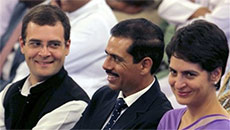Chef Ranveer Brar feels every country has an identity stamp and India holds the fort for its flavours which is distinct and authentic hence important to be showcased.
"Every country has an identity stamp and whether we like it or not our flavours are our distinct and authentic identity stamp and hence anything to do with our culture needs to be showcased because that's eventually our identity," Brar told IANS over an email when asked about emphasising on the importance of promoting local culture through food.
He was talking on the sidelines of the launch of Kellogg's India's new range of Corn Flakes -- Thandai Badam, Kesar Pista Badam and Rose Badam that have been created in consultation with Brar.
These variants are inspired by flavours that Indians have a strong cultural connect to, he said.
Talking about the memories growing up with these flavours, the popular chef said: "For me Lucknow has a lot to do with who and what I am today. Being a Punjabi also and when the medium is milk, it comes naturally to Indians in particular.
"Like I always say, Kesar Pista is a combination that has been ingrained in us as mithai. Similarly, chilled milk has been ingrained into our heads as Rose, whether its Falooda or Roohafza; and festive milk has been ingrained as Thandai, especially for most North Indians."
"For ingredients and flavours that have such a large time stamp and memories attached, it makes sense to evoke those instinctively natural flavours first," he said.
"These flavours cross all age barriers -- to the new generation they are still fascinating and to the older ones, they still evoke a sense of nostalgia -- these are flavours all of us connect with," he added.
Brar's television shows include "Breakfast Xpress", "Snack Attack" , "Homemade", "The Great Indian Rasoi" and "Thank God It's Fryday".
He was also one of the judges for Season four of "MasterChef India", based on the British competitive cooking game show, "MasterChef", alongside fellow chefs Sanjeev Kapoor and Vikas Khanna.
Talking about local cuisine that often gets affected according to the number of tourists or the western influence, he told IANS, "I think it's a natural balance that gets struck, I don't think we should force ourselves on food either way, because that's the worst thing you can do.
"So, if you are trying too hard to please non-Indians that's too bad and trying too hard to be Indian by not pleasing any non-Indian that's also bad."
"I think letting food evolve naturally, is the only way," Brar said.
And what about food being industralised on a global scale?
"With the kind of population growth that we have and the challenges that we are looking at it is only natural, we use science and technology to help us.
"At the same time, the involvement of a chef in that process is a must because there has to be some custodian of a cultural and flavour identity to guide you through the whole process," he told IANS.

